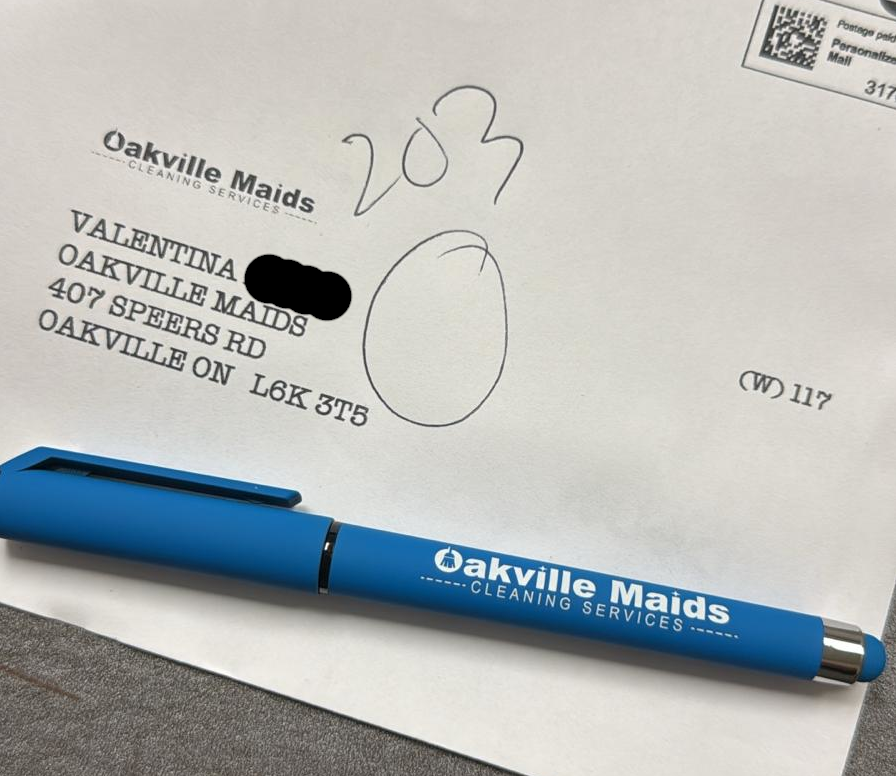
The other day, Oakville Maids got some mail. Nothing unusual: bills, flyers, the usual stack of “stuff we’ll deal with later.” But tucked inside one bulging envelope was… a pen.
Not just any pen. A pen with our logo on it.
And suddenly, we felt like we owed somebody money.
Free Stuff: A Trojan Horse for Your Wallet
If you’ve ever read Robert Cialdini’s Influence: The Psychology of Persuasion, you know exactly what’s happening here. It’s the rule of reciprocity: the idea that if someone gives us something, we’re hardwired to want to give something back.
It doesn’t even matter what the gift is. Coffee, cookies, or a pen that may or may not run out of ink in three weeks. The effect is the same. Our brains whisper, “Hey, they gave us something… shouldn’t we do something nice for them, too?”
Marketers love this trick. They’re not just being generous. They’re Jedi mind-tricking us into opening our wallets.
Case Study: The Pen Sitting on Our Desk
We didn’t ask for this pen. We didn’t need this pen. Honestly, we already own 42 pens. But because it was free and customized with our name, it feels wrong to just toss it in a drawer.
Now, every time we use it, there’s that little tug in the back of our minds: “Maybe we should order a box of these… you know, just to be polite.”
That’s reciprocity in action. One minute you’re writing a grocery list, the next you’re browsing bulk pen catalogs.
Why Reciprocity Is Hardwired Into Us
Here’s the wild part: reciprocity isn’t just social etiquette. It’s baked into our DNA.
Back in prehistoric times, survival depended on sharing. If your neighbor brought back a mammoth steak, you better believe you were offering up berries or firewood the next day. Otherwise, you’d get left out — and hungry.
Over thousands of years, this “give and take” system turned into a survival code. Our brains learned that when someone gives, we give back. Do it well, and the group thrives. Ignore it, and you risk being the caveman nobody invites to dinner.
Fast-forward to today: no more mammoth steaks, but the instinct is still there. Only now, it’s triggered by free samples at Costco, “complimentary” upgrades, and yes, even a pen in the mail.
How We Use Reciprocity at Oakville Maids
The funny thing is, cleaning services use this same principle all the time (minus the surprise office supplies). For example:
- Leave behind a little thank-you gift after a deep clean → clients feel warm and fuzzy → they book again.
- Offer a referral discount → happy clients “return the favor” by telling friends.
- Go the extra mile with customer service → clients repay us with loyalty and glowing reviews.
The trick isn’t manipulation. It’s about giving people a genuine, positive experience that makes them want to give back.
Pens, Psychology, and Polished Floors
So yes, the free pen sitting on our desk is sneaky marketing. But it’s also a reminder: sometimes the best way to earn business isn’t asking for it; it’s giving first.
Whether it’s a shiny new pen or a freshly cleaned kitchen, generosity leaves people feeling grateful… and a little bit obligated.
And hey, if Oakville Maids ever sends you free pens, don’t worry. You don’t have to order a cleaning just to balance the cosmic scales. But we wouldn’t complain if you did. 😉